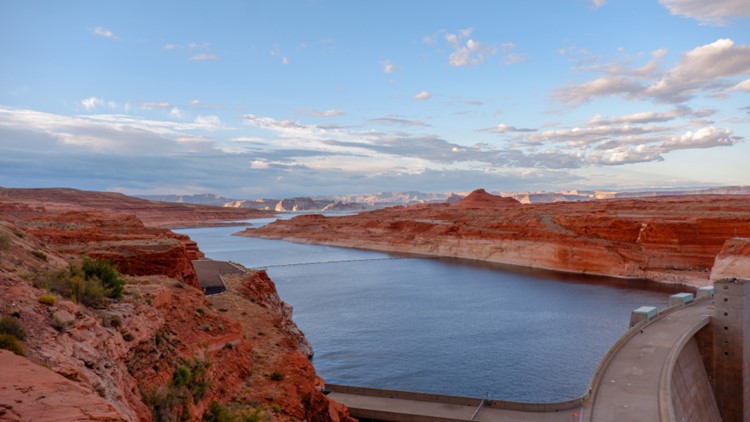UTAH, USA — For more than 20 years, negotiations among the seven states that rely on the Colorado River have avoided lawsuits, even as drought and population growth threaten the river’s flows.
That may change as a promise to rush the environmental review of a diversion project between the Colorado River’s upper and lower basins has six states suggesting lawsuits challenging the project could topple years of agreements.
Colorado this week joined Arizona, California, New Mexico, Nevada and Wyoming in protesting a fast-tracked environmental review of the 140-mile Lake Powell Pipeline in Utah. Using special “national emergency” executive powers the president has during the pandemic, the Trump Administration in June ordered the Interior Department to scale back environmental reviews of major infrastructure projects.
This story is powered by COLab, the Colorado News Collaborative. 9NEWS joined this historic collaboration with more than 40 other newsrooms across Colorado to better serve the public.
“Antiquated regulations and bureaucratic practices have hindered American infrastructure investments” and slowed growth in construction and trade jobs, President Donald Trump said in the June 4 executive order.
“Unnecessary regulatory delays will deny our citizens opportunities for jobs and economic security, keeping millions of Americans out of work and hindering our economic recovery from the national emergency,” Trump wrote in the order, which did not cite specific projects. The Associated Press last week identified more than 60 energy, environmental, natural resource and transportation projects slated for expedited review, including the Lake Powell Pipeline.
The six states, in a letter sent Tuesday to Secretary of the Interior David Bernhardt, said the probability of multi-year litigation over a rushed approval of the 20-year-old Lake Powell Pipeline plan was “high.”
The Colorado River Basin states have been working with Utah on details of the Lake Powell Pipeline plan for years. The project would divert 86,000 acre-feet of Utah’s allocated water from Lake Powell -- which is the largest storage bank for managing upper basin water -- to fast-growing downstream communities in the Colorado River’s lower basin in southwest Utah.
RELATED: Pitkin County launches project to restore ancient wetland at North Star Preserve near Aspen
The issue is not necessarily the actual water. The project would move water that belongs to Utah. But the transfer of water from the upper basin to the lower basin has traditionally involved agreement between all seven Colorado River Basin states on details like accounting for the diverted water and how that fits into recent drought plans. The states were working on those details when the project was identified for a hurried final decision.
“This diversion and use of Colorado River water as currently described by Utah and the Lake Powell Pipeline Draft Environmental Impact Statement … raises significant questions” under 1922 and 1948 agreements, reads the letter, which notes that the basin states did agree to divert upper basin water to the lower basin in New Mexico with the under-construction Navajo-Gallup Water Supply Project.
“As a result of the collaborative approach embodied in these successes and other efforts, we have not only limited the risk that the Colorado River system will crash, we have done so without introducing the unpredictability and untimeliness of having courts weigh in on Colorado River management,” the letter reads.
The six states have not spoken publicly about Utah’s Lake Powell Pipeline project until now.
Public comment on the Bureau of Reclamation’s Draft Environmental Impact Statement studying the pipeline ended Tuesday, setting up a final decision that could come soon under the Trump Administration’s order to fast-track the process.
“The Lake Powell Pipeline’s prospects for success are substantially diminished if we are compelled to address such issues in the context of the current Lake Powell NEPA process rather than through the collaborative, seven-state process we have developed,” the letter to Bernhardt from the six states reads.
The states also said the lawsuits likely would raise “certain Law of the River questions” that should be left to the states to resolve. Wrangling in court, the letter reads, “is not the recipe for creating the kind of meaningful and positive change needed to sustain the Colorado River in the coming decades.”
The line between the upper and lower basins anchors the complex arrangement among Colorado River Basin states known as the Law of the River, which dates back to 1922 and governs pretty much every drop of the Colorado River.
The Law of the River has been forged through collaborative work among all seven states that rely on the Colorado River. As a now 21-year drought shrinks flows in the river while populations grow in each of the states, the compacts governing the Colorado River have been reached without the need for lawsuits or legal intervention forcing cuts or curtailments. Interim guidelines for lower basin shortages and last year’s “pain-sharing” drought contingency plans involved intense negotiations among the states as the volume of water flowing down the Colorado River failed to meet the demand. All of those negotiations revolve around storage and releases in the basin’s two impoundments, Lake Mead and Lake Powell.
A rushed Final Environmental Impact Statement could establish protocols for moving water from the upper basin to the lower basin without basin-wide agreement on details like the accounting of the diversion, use of the water and other operational issues under the Law of the River.
“Really what we were trying to convey in the letter is that the Colorado River Basin states have a long history of working together collaboratively and working toward consensus,” said Becky Mitchell, the director of the Colorado Water Conservation Board who signed the letter to Bernhardt. “These relationships have successfully guided the management and operations of the system for many years. That’s why we have requested the Department of Interior refrain from issuing the Final Environmental Impact Statement and Record of Decision until we have time to really reach consensus on the legal and operational issues.”
SUGGESTED VIDEOS: Local stories from 9NEWS



